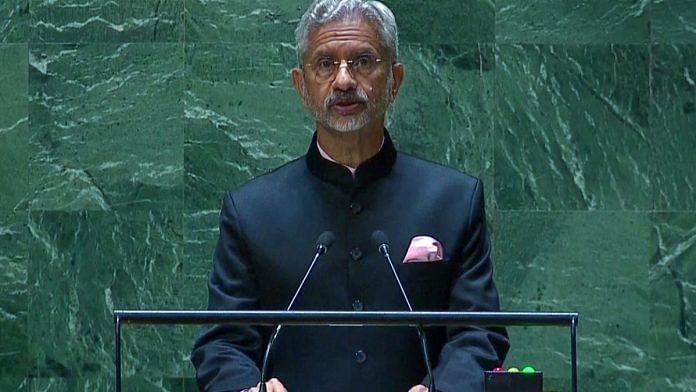New Delhi: The days when a few nations set the agenda and expected others to fall in line are over, foreign minister S. Jaishankar said at the United Nations Tuesday, amid the massive diplomatic showdown with Canada.
In his address at the 78th United Nations General Assembly in New York, the minister said, “In our deliberations, we often advocate the promotion of a rules-based order. From time to time, respect for the UN Charter is also involved.
“But for all the talk, it is still a few nations who shape the agenda and seek to define the norms. This can’t go on indefinitely nor will it go unchallenged. A fair, equitable and democratic order will surely emerge once we all put our minds to it. And for a start, that means ensuring that rule-makers do not subjugate rule-takers. After all, rules will work only when they apply equally to all.”
Jaishankar began his speech by pledging India’s full support to the 78th UNGA’s theme of “rebuilding trust and reigniting global solidarity”. “This is an occasion to take stock of our achievements and challenges even while sharing our aspirations and goals,” he said, adding India had much to share in regard to both.
He added the world was witnessing an “exceptional period of turmoil”, the foreign minister said: “As it is, structural inequities and uneven development have imposed burdens on the Global South. But stresses have been aggravated by the impact of the Covid 19 pandemic and the repercussions of ongoing conflicts, tension and disputes.”
He said as a result socio-economic gains of recent years had been rolled back, resources for sustainable development were severely challenged, and many countries really struggled to make ends meet. “Navigating the future appears even more daunting today,” Jaishankar said.
He said India took up the presidency of the G20 at this juncture with “a sense of exceptional responsibility”, adding, “Our vision of ‘One Earth, One Family, One Future’ sought to focus on the key concerns of the many, not just the narrow interests of the few.”
Jaishankar quoted Prime Minister Narendra Modi in his speech, saying this effort was to bridge divides, dismantle barriers and sow seeds of collaboration that nourished a world where unity prevailed over discord and where a shared destiny eclipsed isolation.
He said the New Delhi G20 leaders’ declarations articulated “our collective ability to do so”. The minister said at a time when the “East-West polarisation was so sharp and the North-South divide so deep”, the New Delhi summit stressed that diplomacy and dialogue were the only effective solutions.
Jaishankar said India began its presidency by convening the voice of the Global South, recognising that “growth and development must focus on the most vulnerable”.
“This enabled us to hear directly from 125 nations and place their concerns on the G20 agenda,” the foreign minister said, highlighting that issues which deserved global attention got a fair hearing.
He said the African Union becoming a permanent G20 member – at India’s initiative – was noteworthy. “By doing so, we gave voice to an entire continent which has long been its due. This significant step in reform should inspire the United Nations, a much older organisation, to also make the Security Council contemporary,” he added.
India also seeks to promote cooperation with diverse partners, he said. “From the era of non-alignment, we have now evolved to that of ‘Vishwa Mitra’ — a friend to the world. This is reflected in our ability and willingness to engage with a broad range of nations and where necessary harmonise interests. It is visible in the rapid growth of the QUAD; it is equally apparent in the expansion of the BRICS grouping or emergence of I2U2 combination,” he said.
He mentioned the recently-passed Women’s Reservation Bill, saying: “Our latest assertion is in path-breaking legislation to reserve one-third of the seats for women in legislatures. I speak for a society where ancient traditions of democracy have struck deep modern roots. As a result, our thinking, approaches and actions are more grounded and authentic.”
The minister said India brought both tradition and technology confidently to the table as “a civilisational polity that embraces modernity”. “It is this fusion that today defines India… that is Bharat,” Jaishankar said.
In his strongly-worded statement, Jaishankar also warned that the world must never again allow “an injustice like vaccine apartheid to recur”. He said climate action too could not continue to witness an evasion of historical responsibilities, adding the power of markets should not be utilised to steer food and energy from the needy to the wealthy.
Jaishnakar added that political convenience should not determine responses to terrorism, extremism and violence. “Similarly, respect for territorial integrity and non-interference in internal affairs cannot be exercises in cherry-picking. When reality departs from rhetoric, we must have the courage to call it out,” the minister said.



